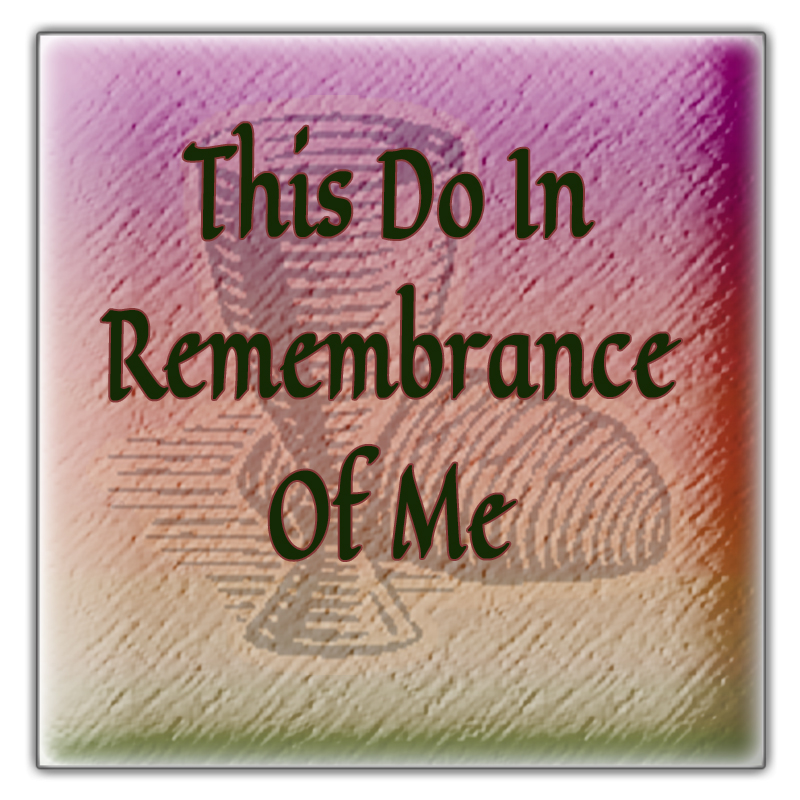
- WHENEVER YOU DO THIS DO IT IN REMEMBRANCE OF ME HOW TO
- WHENEVER YOU DO THIS DO IT IN REMEMBRANCE OF ME FULL
- WHENEVER YOU DO THIS DO IT IN REMEMBRANCE OF ME SERIES
- WHENEVER YOU DO THIS DO IT IN REMEMBRANCE OF ME FREE
” In the same way also the cup, after supper, saying, “This cup is the new covenant in my blood. Then during one of the last times I led my Presbyterian congregation in the Lord’s Supper, I was up front before the table, holding aloft a loaf of bread, and as I broke the bread, I recited, as usual, the words of consecration from Saint Paul’s First Letter to the Corinthians, 11:23-26, as given in the official Presbyterian Book of Worship:įor I received from the Lord what I also delivered to you, that the Lord Jesus on the night when he was betrayed took bread, and when he had given thanks, he broke it, and said, “This is my body which is for you. So dealing with John 6 remained far back on the nice shelf.
WHENEVER YOU DO THIS DO IT IN REMEMBRANCE OF ME FULL
I knew full well what the Bible said in the Gospels and Paul’s letters, but the wide breadth of contradictory opinions held by Christians on the topic only denuded any sense of urgency to reconsider my own opinion on this.
WHENEVER YOU DO THIS DO IT IN REMEMBRANCE OF ME HOW TO
How this led to the other verses that drew me toward the Catholic Church is another story, but for me, the issue of how to understand the Eucharist began as nothing more than a hodgepodge of opinions. Rather, it began my thinking for the first time in my life that Scripture alone was not sufficient because the Church was the “pillar and bulwark of the truth.” But which church? It was in this that I began to see that being a member of a “church” was somehow necessary for at least knowing the truth, if not for salvation. This was what began my “journey home,” but it did not make me a Catholic. I hope to come to you soon, but I am writing these instructions to you so that, if I am delayed, you may know how one ought to behave in the household of God, which is the church of the living God, the pillar and bulwark of the truth. In this article, I’d like to go through, as chronologically as I can, how Scripture convinced me that Jesus was speaking very seriously when He said, “Unless you eat my body and drink my blood, there is no life in you.” No Catechism or other Catholic Church documents would have impressed me no skillful Catholic apologist would have bugged me I had to see it in the Bible alone.Īnd the first verse that got my attention was 1 Timothy 3:14-15.

WHENEVER YOU DO THIS DO IT IN REMEMBRANCE OF ME SERIES
Then, a series of “verses I never saw” began changing my life.
WHENEVER YOU DO THIS DO IT IN REMEMBRANCE OF ME FREE
I believed the Lord’s Supper was not a symbol, but a reminder, just like the New Testament is lifting up the bread was a reminder of John 3:16, that “God so loved the world that he gave his only begotten son, that whosoever believes in him would not perish but have everlasting life.” In the busy-ness of our lives, we can forget what this is all about the Lord’s Supper was a way of remembering and celebrating that we have been saved from damnation by His free giving of Himself on the cross, through the spilling of His Blood. Every month, I insisted that my congregation make this celebration special, because I took Jesus’ words seriously: we were to do this in memory of Him - as a reminder of what He had done for us on the cross. During these years, the Lord’s Supper was a very meaningful part of my faith life. Then after a life-changing, born-again conversion, my second twenty years consisted of a variety of evangelical ministries, which included seminary and then nine years as an ordained minister.

To me, the monthly celebration of the Lord’s Supper was nothing more than a Sunday ritual. My first twenty years were as a baptized yet nominal Lutheran. But in the end, it was this verse that sealed the deal on my convictions.įor the first forty years of my life, I at best considered the Lord’s Supper to be only symbolic. I did not come to accept the Catholic Church’s teaching on the Real Presence of Christ in the Eucharist because of this text, and frankly, I don’t think any apologetic argument based on this text would have broken through my thick Evangelical, subtly anti-Catholic, shell. This chapter in John remained safely untouched up on the nice shelf. In fact, I pretty much avoided John 6 during my fifteen-plus years in Protestant ministry because I was uncomfortable with this very question: symbolic or literal. Jesus once said, “Unless you eat my body and drink my blood, there is no life in you” but did He mean His words to be taken symbolically or literally? This text comes from the Gospel of John, 6:53, a text I never preached on as a Presbyterian minister. Resources for Non-Catholic Clergy and Ministers.Bible and the Catechism in a Year Reading Plan.Supporting Members of the Coming Home Network.


 0 kommentar(er)
0 kommentar(er)
